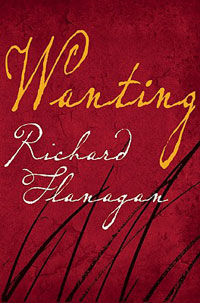A Fictional Dickens

Tasmanian (go ahead, tell me you know where Tasmania is) novelist Richard Flanagan (Gould's Book of Fish, The Unknown Terrorist [which he dedicated to the beleaguered and persecuted Australian Muslim convert David Hicks]) joins a growing and welcome list of novels that have the illustrious 19th century English cultural giant and the world's most famous novelist of his day, Charles Dickens, as a character. If memory serves me, that includes Australian expatriate Peter Carey's Jack Maggs and Joseph O'Connor'sStar of the Sea.
Flanagan's Wanting (Atlantic Monthly Press) is set in the South Pacific and England in the middle of the 19th century. Sir John Franklin, the most celebrated explorer of his era, is prodded by his wife into adopting a young Aboriginal girl, Mathinna. As this "experiment" fails--Flanagan gives a vivid and harrowing sense of the depredation visited on the native peoples--Sir John is replaced as the viceroy and ends up returning to Arctic exploration, where his next expedition kills everyone involved. After some time, Franklin's widow enlists the influential Dickens in a campaign to rebut the persistent rumors that the explorer's disastrous final project ended with cannibalism.
Flanagan dovetails the two narratives, primitive Mathinna's and rags-to-riches Dickens's, into an intense and resonant exhibition of desires constrained and unleashed. The author has filmmaking experience, having written and directed the film of his first novel, The Sound of One Hand Clapping, and collaborated with Baz Luhrmann on the screenplay of Australia--wonderful as this novel is, it too would make a compelling film.
In May of this year Flanagan gave the closing address at the Sydney Writers' Festival. Though as eloquent a brief for the continuation of territorial copyright as any powerful oration, it has greater application and specific gravity:
